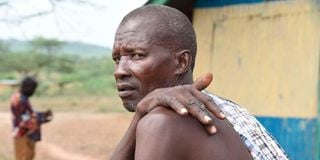
Thomas Kibet (left), the head teacher at Kagir Primary School in Baringo North sub-county, with village elder Solomon Chemitei during an interview on July 30. Mr Kibet became blind after being shot by bandits during a raid.
| Jared Nyataya | Nation Media GroupNews
Premium
Banditry victims bear lifelong scars
What you need to know:
- The practice of livestock raiding has evolved over the years to become an organised crime.
- Raiders use modern weaponry and spare no one, including women and children.
Thomas Kibet, a 52-year-old primary school head teacher in Kagir, has suffered immensely from the incessant banditry attacks in the area and lives with a permanent reminder.
And the reminder came quite early in his life, when he was barely nine years old.
Mr Kibet was herding his father’s livestock in the grazing fields in 1978 when armed criminals from the neighbouring community struck and drove away all their 35 cows and left him to die after shooting him.
“Though the attack happened four decades ago, the day is still etched in my mind because it left me with a permanent disability – blindness,” said Mr Kibet who dons dark glasses, perhaps to conceal his disability.
A bullet hit his right hand and went through his eyes. Being alive today, for him, is a miracle.
“Those who took me to hospital say they thought I was already dead because I passed out,” he said.
He spent several months at a Nakuru hospital and his father spent thousands of shillings to cater for his medication. After being released from hospital, Kibet was sponsored by well-wishers to study at the Thika School for the Blind and later graduated as a primary school teacher.
“The attacks quelled for some years after that incident, then erupted again in 2008 when several people lost their lives and others their livelihoods. I also lost 60 cows in the attack,” said Mr Kibet.
Despite the good he does for the community, and his disability, he was ambushed again by criminals in 2019 along the Kagir-Loyamorok road while on a motorcycle together with a woman who is a neighbour.
“The gun-wielding criminals, who were very young, ordered us to stop before stripping us naked and robbed me of Sh33, 000, a phone and other belongings including those of the rider and my neighbour. We were lucky then that they spared our lives because several villagers plying the route have lost their lives to the bandits,” said Mr Kibet.
Loss of lives and displacement
Mr Kibet rose through the teaching ranks to become a head teacher in the same area, opting to help the learners because many people fear working in the area.
“Many teachers have been deployed here but they transfer elsewhere after some few months for fear of their lives. Though I have been hard hit, I chose to come and help the learners in my village because if we go elsewhere, then who will teach them?” he posed.
Livestock raiding in the pastoralist communities has changed profoundly over the years. With the proliferation modern firearms, it has intensified and turned in to an organised crime entrenched in the Ilchamus, Tugen, Samburu, Turkana and Marakwet communities in the North Rift region.
The perennial raids have led to the loss of lives, property and displacement of many people.
Hundreds of the affected in Baringo County are still nursing their wounds, with some suffering permanent disabilities.
On a tour to the banditry prone villages of Ng’aratuko,Natan,Kagir, Yatya and Chemoe in Baringo North, the Saturday Nation came face to face with the harsh existence people in these areas have had to bear in the hands of the gun-wielding criminals. Every family here has lost a relative to the criminals.
Alex Chebon, 27, from Tuluk village has also been hard hit by the runaway insecurity – he was shot by bandits in 2019 while pursuing stolen livestock with other villagers. Like other victims, he lives with a constant reminder of the attack, which also rendered the villagers paupers after the criminals made away with hundreds of livestock.
He recalls that on the fateful day, they received information that criminals from Silale in the neighbouring Tiaty had ambushed some herders and driven away hundreds of livestock.
“We rounded up several men and embarked on the mission to recover the herd. But the criminals spotted us and laid an ambush along the way and I ended up being shot on the stomach. I fell down and passed out,” said Mr Chebon.
Security officers attached to the Anti-Stock Theft Unit (ASTU) stationed at Chemoe repulsed the attackers and rushed him to Marigat sub-county hospital for first aid before being referred to the Nakuru Level Five hospital.

Alex Chemjor, a resident of Chemoe, was shot in the stomach by bandits while pursuing stolen animals.
“I spent six months in hospital and ended up spending more than Sh118, 000 on surgery. My family has sold everything to cater for my medication, but I am still grappling with sickness even after being discharged. My urinal system was affected and I am now using a catheter to drain urine,” said the distraught man.
Due to the perennial attacks, Chebon’s parents fled elsewhere for safety, leaving him behind with his family.
“I have been left destitute with my young family after being displaced from our homes. I was supposed to go back to hospital for a corrective surgery which would cost about Sh180,000 but I do not have money for food, leave alone medication. I am resigned to my fate,” he said while fighting back tears.
Another victim, Joseph Chepkangor, was also shot by bandits while herding goats in Yatya village in 2018.
“I was herding in the bush when I was ambushed by armed criminals from the neighbouring community. They fired several gun shots to scare me and as I ran for safety, I came face to face with one of them who shot me in the chest. They then drove the goats leaving me for dead,” said Mr Chepkangor who has also lost five relatives to banditry attacks. He was rushed to Baringo Referral Hospital, where he spent the next three months nursing injuries.

Joseph Chepkangor, 40, a resident of Kagir in Baringo North, shows a scar on his chest after bandits attacked him in 2015. His brother was killed in the same year while pursuing raiders who had stolen their 70 goats and 18 cows.
Hundreds of his livestock have were taken away by the rustlers who also torched their houses after looting. Some of the locals in the area are now living within the shopping centre for security purposes, leaving behind farms that used to supplement livestock keeping proceeds.
Jeremiah Cheptoo, also from Yatya, is still nursing bullet wounds he sustained in 2018 after he was ambushed and shot by bandits in his homestead.
Mr Cheptoo had just retired to bed after day-long herding when his dogs started to bark continuously, an indication that made him suspect that all was not well.
“I woke up and opened the door only to be met by a gun wielding criminal who shot me three times on the hip, shoulder and the elbow. Suspecting I was dead, they drove away 52 sheep and 48 goats,” he said while showing the scars left on his body by the bullets.
Like the others, he was taken to the hospital in Kabarnet, about 80 kilometres away, where he nursed his injuries for two months, punching a Sh25,000 hole in the struggling village that had to fundraise to help pay his hospital bill.
Security officers deployed in the banditry prone areas to restore normalcy have also borne the brunt of the attacks, with several of them killed while responding to distress calls by locals or when on routine patrols.
During an attack in Chemoe in December last year, for example, a security officer was gunned down by criminals suspected to be from Tiaty sub-county. Patrick Kingori, who was attached to the Anti- Stock Theft Unit (ASTU), together with nine of his colleagues, were on December 31 ambushed by an unknown number of criminals who shot at them before fleeing.
“The10 officers attached to the Anti-Stock Theft Unit were carrying out normal patrol along the porous area in the morning. Thereafter they decided to fetch some firewood along the way when they were ambushed and shot at by armed criminals suspected to be from the neighbouring community,” said Baringo North sub-county police commander Fredrick Odinga.

Aron Kiburet, 45, shows the scar left after he was shot by bandits.
The attack prompted the government to launch a massive security operation in Tiaty to flush out criminals, recover stolen livestock and seize illegal guns.
In the past, the bandits used to target men herding livestock, but women and children are no longer being spared.
In 2017, 33-year-old Josephine Kipkemei was shot dead with her two-day old baby in Natan while trying to flee to safety. The killings sparked a mass exodus in Yatya, Natan, Kagir, Barsuswo, Chemoe and Chepkesin village which also led to a closure of institutions in the affected areas.
Due to the incessant attacks, there are no public vehicle plying the areas and locals have been forced to hike lifts from police vehicles as they also seek safety. But police vehicles have also become targets foe the criminals.
The rugged terrain and deep gulleys formed through soil erosion have provided the bandits with hideouts from which they launch attacks.
Locals in the region have over the years demanded the provincial administration takes action over the insecurity. Led by Richard Chepchomei, they accuse the government of being lenient on the bandits, some of whom are well known.
“Our people no longer go about their daily chores freely. As other children go to school, ours stay at home. Some residents have even deserted their homes,” he said.
Joshua Changwony from Ng’aratuko questioned why sometimes animals are recovered yet those in possession of them are not arrested.
Massive disarmament
“It is raising eyebrows because we are tempted to think that the criminals are being protected by some people,” he said.
Residents also attribute the increased attacks to a move by the government to disarm police reservists.
“The reservists are familiar with the rough terrain and normally help to repulse armed criminals and recover stolen livestock,” he added.
John Wendot, a resident of Kasiela in Baringo South said locals live in fear of attacks from the bandits.
“We are still wondering why the government had to take the guns that were in the hands of reservists deployed in banditry prone areas in Baringo instead of carrying out massive disarmament to seize all illegal firearms owned by civilians first, which are too many compared to theirs,” said Mr Wendot.
More than 450 police reservists had been deployed in the insecurity prone areas in 2016.
During the registration of firearms used by police reservists in Marigat recently, the Assistant Inspector-General in charge of reservists in the country Robert Kitur said the exercise aims to help the government know the number of reservists deployed in each county and to determine the budgetary allocation required for them to undergo fresh training. He also said the exercise would help weed out rogue officers.
Rift Valley regional coordinator George Natembeya confirmed to the Saturday Nation that though they have the names of suspected criminals, the exercise is not a walk in the park. He said the rugged terrain in the areas where the criminals have fled to is posing a major challenge.
He also said that poor network coverage in the insecurity prone areas was a hindrance. He went on to hint that the government is mulling the redeployment of police reservists.
“We are aiming to seize all firearms in the hands of civilians and no community will be left out, no matter how long it will take. We are not going to withdraw until we achieve our targets,” said Mr Natembeya.





